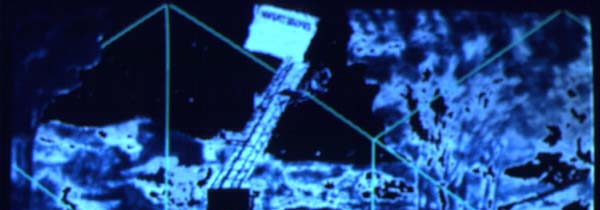In The Critical Historians of Art, Michael Podro distinguishes questions that are "archaeological" from "critical" questions. The latter, which address the role and nature of concepts of art, "require us to see how the products of art sustain purposes and interests which are both irreducible to the conditions of their emergence as well as inextricable from them." (pxviii)
Read Morecritique of Judgement
For Kant, The power of judgement is a mediating element between (theoretical) understanding and (practical) reason, between concepts of nature and concepts of freedom (natural philosophy and moral philosophy, the sensible and the supersensible), between the is and the ought.
Read Morecuber(t)

This project dates from 1984, and its caption, "This may seem an inordinately abstract and circuitous entry into our subject." may now not seem so provocative or even accurate. (The caption, incidentally is a quote from an essay by Hayden White in his study of historical writing as narrative form.)
Read MoreCybernetics
Cybernetics: (derives from the Greek word for steersman, which was used by Plato in the sense of "government."):The technology of process control was developed by Norbert Weiner into "the field of control and communication theory (based on statistical information) , whether in the machine or animal" . The terms was first introduced in 1947. See Wiener Cybernetics.
Read Moreculture
According to Franz Boas, culture is "the totality of socially transmitted behavior patterns, arts, beliefs, institutions, and all other products of human work and thought." A civilization is the broadest cultural entity, with the longest story as well.
For Levi-Strauss, "Any culture may be looked upon as an ensemble of symbolic systems, in the front rank of which are to be found language, marriage laws, economic relations, art, science, and religion." (Introduction to Marcel Mauss). For anthropologists, culture is "the order of life in which human beings construct meaning through practices of symbolic representation." For anthropology, representation is a distinctive manner of imagining the real, and is a fundamental phenomenon upon which all culture rests. (Clifford Geertz)
Read MoreCyberscience
Evelyn Fox Keller calls information theory, cybernetics, systems analysis, operations research, and computer science all parts of "cyberscience."
Read Morecyborg
Is the cyborg an improved hybrid species that has the capacity to be humanity's evolutionary successor? This is the starting point for Manuel DeLanda's evocation of future "robot historians" writing the history of " War in the Age of Intelligent Machines." Warfare has been the primary arena for the technological development of cybernetics, but the cyborg has become a figure that brings toget her science fiction and technology in unexpected combinations. If the Terminator and Robocop exemplify some of the issues of aggression for a masculine image of the cyborg in the contemporary imagination, the concept has been developed in a feminist perspective as well.
Read Moredeath
In Totem and Taboo, Freud traced the evolution of attitudes toward death in human civilization -- toward individual death and death in general -- to death as the ultimate expression of human helplessness. (Shur, Freud Living and Dying, p. 280)
Read Moredesire
Freud's use of the word Wunsch, which corresponds to 'wish' does not have the same connotations as the English word 'desire" or the French désir . His clearest elucidation of the concept is in the theory of dreams. Freud does not identify need with desire. Need can be satisfied through the action which procures the adequate object. (eg. food) Wishes, on the other hand, are governed by a relationship with signs, with memory-traces of excitation, and the desire to re-cathect mnemic images. The Freudian conception of desire refers above all to unconscious wishes, bound to indestructible infantile signs, organized as phantasy.
Read Moredesiring machines
In the Anti-Oedipus, subtitled Capitalism and Schizophrenia, volume 1, and first published in 1972, Gilles Deleuze and Félix Guattari engaged in a radical critique of Freudianism. Like their contemporary, R.D. Laing, and like Wilhelm Reich before them, they linked psychic repression with social repression, and sought to recover the revolutionnary quality of desire.
Read Moredimension
Some different mathematical notions of dimension are: correlation dimension, embedding dimension, topological dimension, Hausdorff dimension, fractal dimension, self-similarity dimension, box-counting dimension, capacity dimension, information dimension. (see scientific space)
dirt
Mary Douglas, in Purity and Danger describes dirt as "that which has no place." As we know it, dirt is essentially disorder. Dirt offends against order. Eliminating it is not a negative moment, but a positive effort to organise the environment. Rituals of purity and impurity create unity in experience. (Mary Douglas, Purity and Danger) (cf formless)
Read Morediagram / abstract machine
A prisoner, in his cell, kneeling at prayer before the central inspection tower. "morals reformed -- health preserved -- industry invigorated --instruction diffused -- public burthens lightened -- Economy seated, as it were, upon a rock .... all by a simple idea in architecture." Jeremy Bentham
Read Morediscourse
In proposing to examine the general economy of discourses on sex, Michel Foucault states his objective of defining "the regime of power - knowledge - pleasure that sustains the discourse on human sexuality in our part of the world." (p.11) For Foucault, "the 'economy' of discourses -- their intrinsic technology, the necessities of their operation, the tactics they employ, the effects of power which underlie them and which they transmit -- this, and not a system of representations, is what determines the essential features of what they have to say." (p.69)
Read MoreDiscipline
In Discipline and Punish, Foucault describes the modern "soul" as the real correlative of a certain technology of power over the body. In this vivid and powerful account, he documented the shift in the techniques of punishment away from the body , "from an art of unbearable sensations" to "an economy of suspended rights." For Foucault, it is not just an issue of dehumanization (as Heidegger saw it) but the transformation of the body and of subjectivities.
"On this reality reference, various concepts have been constructed and domains of analysis carved out: psyche, subjectivity, personality, consciousness, etc; on it have been built scientific techniques and discourses, and the moral claims of humanism." (p.30)
(see subject )
See the panopticon as the diagram of modern power. (see also biopower)
The history of work is a history of discipline.
distinctions theory
Is hierarchy inevitable when making dichotomous distinctions? Does one term inevitably become the priveleged term and the other its suppressed, subordinated, negative counterpart?
Read Moredynamics
a dynamical system consists of a space, or manifold, where the motion of the system takes place, and a rule of motion, or vector field. The starting point is called the initial state, and the path of motion the trajectory. The end point of a trajectory is the system's attractor.
durée
For Henri Bergson, duration is not an objective mathematical unit, but the subjective perception of space-time. Bergson believed that the conventions of scientific practice were incompatible with lived experience. In his "Essay on the Immediate Data of Consciousness" (1889), Bergson argued that experience viewed as a succession of separate, thinglike states is no less an abstraction from lived consciousness than time as measured by the hands of a clock. Both are fundamentally spatial. Lived consciousness, on the other hand, is a spatiotemporal continuum, "like a mutual penetration, a solidarity, an intimate organization of elements, each of which is representative of the others and neither distinguished from nor isolated by abstracting thought." (see also memory)
For Bergson, we can describe the movement of an object in space, for example, by postulating an infinite number of reference points, through which the object may be said to move. But "they are not parts of the movement; they are so many views taken to it; they are, we say, only supposed stopping points. Never is the mobile reality in any of these points; they most we can say is that it passes through them." Bergson proposed a division of labor between the analytical methods of scientists and the intuitions of the metaphysicians, who would strive for a "true empiricism" that would seek to keep "as close to the original itself as possible."
Read Moreego

what is the relation between the ego and the subject? According to Freud, the ego is an agency of the psyche,by means of which the subject aquires a sense of unity and identity, "a coherent organization of mental processes." (XIX,17.) Through consciousness , the ego is the site of differentiation between inside and outside, between "subjective" and "objective." The passage from the ego as biological individual to the ego as an agency: "such is the entire problematic of the derivation of the psychoanalytic ego . " (Jean Laplanche, Life and Death in Psychoanalysis, p. 76)
Read Moreelectronic media
"After three thousand years of explosion, by means of fragmentary and mechanical technologies, the Western world is imploding. During the mechanical ages we had extended our bodies in space. Today, after more than a century of electronic technology, we have extended our central nervous system itself in a global embrace, abolishing both time and space as far as our planet is concerned." (Marshall McLuahan, Understanding Media.)
Read More